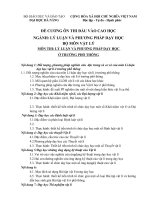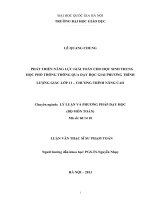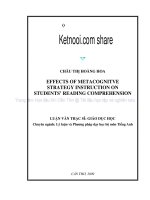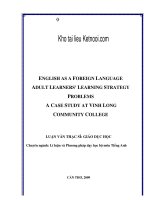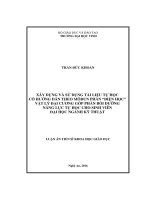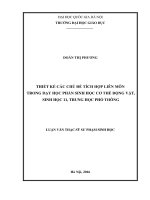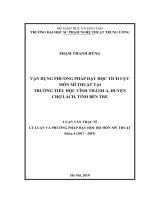LÝ LUẬN VÀ PHƯƠNG PHÁP DẠY HỌC BỘ MÔN TIẾNG ANH - EFFECTS OF METACOGNITVE STRATEGY INSTRUCTION ON STUDENTS’ READING COMPREHENSION
Bạn đang xem bản rút gọn của tài liệu. Xem và tải ngay bản đầy đủ của tài liệu tại đây (992.37 KB, 120 trang )
Ộ
Ketnooi.com share
CHÂU THỊ HOÀNG HOA
EFFECTS OF METACOGNITVE
STRATEGY INSTRUCTION ON
STUDENTS’ READING COMPREHENSION
Trung tâm Học liệu ĐH Cần Thơ @ Tài liệu học tập và nghiên cứu
LUẬN VĂN THẠC SĨ: GIÁO DỤC HỌC
Chuyên ngành: Lý luận và Phương pháp dạy học bộ môn Tiếng Anh
CẦN THƠ, 2009
BỘ GIÁO DỤC VÀ ĐÀO TẠO
TRƯỜNG ĐẠI HỌC CẦN THƠ
CHÂU THỊ HOÀNG HOA
TÁC ĐỘNG CỦA VIỆC HƯỚNG DẪN
CHIẾN LƯỢC ĐỌC PHẢN TĨNH ĐỐI VỚI
Trung tâm Học
liệuNĂNG
ĐH CầnĐỌC
Thơ @HIỂU
Tài liệu
học tập
và nghiên
KHẢ
CỦA
SINH
VIÊNcứu
Chuyên ngành: Lý luận và Phương pháp Giảng dạy Tiếng Anh
Mã số: 160607
LUẬN VĂN THẠC SĨ: GIÁO DỤC HỌC
Người hướng dẫn khoa học:
Ths. Lê Thị Tuyết Mai
CẦN THƠ, 2009
ii
MINISTRY OF EDUCATION AND TRAINING
CAN THO UNIVERSITY
CHAU THI HOANG HOA
EFFECTS OF METACOGNITIVE
STRATEGY INSTRUCTION ON
STUDENTS’ READING COMPREHENSION
Trung tâm Học liệu ĐH Cần Thơ @ Tài liệu học tập và nghiên cứu
Program: Principles and Methods in English Language Education
Program code: 60 14 10
MASTER THESIS: EDUCATION
Supervisor: Le Thi Tuyet Mai (M.Ed.)
CAN THO, 2009
iii
Luận văn Thạc sĩ với đề tài:
“The Effects of Metacognitive Strategy Instruction on Students’ Reading
Comprehension” do học viên Châu Thị Hoàng Hoa thực hiện và báo cáo đã được
Hội đồng Chấm Luận văn thông qua.
Ủy viên
Thư ký
…………………………
…………………………
Giáo viên phản biện 1
Giáo viên phản biện 2
Trung tâm Học liệu ĐH Cần Thơ @ Tài liệu học tập và nghiên cứu
…………………………
…………………………
Cần Thơ, ngày ……tháng……năm 2009
CHỦ TỊCH HỘI ĐỒNG
…………………………….
iv
DECLARATION
This thesis entitled “The Effects of Metacognitive Strategy Instruction on
Students’ Reading Comprehension” is conducted under the supervision of Ms. Le
Thi Tuyet Mai. It is ensured that this thesis has not been accepted for any degree and
or concurrently submitted in any candidature for any other degree or diploma.
Supervisor
Researcher
Lê Thị Tuyết Mai
Châu Thị Hoàng Hoa
Trung tâm Học liệu ĐH Cần Thơ @ Tài liệu học tập và nghiên cứu
v
ACKNOWLEDGEMENTS
This research paper is completed thanks to the support of many people. I would like to
show my gratitude to all of them.
The first acknowledgements are made to my research methodology instructor Dr. Trinh
Quoc Lap who trained me research methodology and initiated the idea of choosing the
research field, and research topic. He spent his time giving valuable comments to my
proposal. His encouragement was unforgettable to me. My thanks are also sent to Dr. Le
Phuoc Loc, who taught me how to research in Vietnamese.
Secondly, I would like to show my deep appreciation and to my supervisor, Ms. Le Thi
Tuyet Mai for her intellectual and material assistance. She was the one who first taught me
what metacognitive reading was. I also owed her for valuable advice as well as supports. I
am indebted to her for her patience to read the drafts of the thesis and gave feedback on
them again and again. She not only leaded me to make first steps in researching way but
also helped me how to be a good teacher. I admired her devotion, sympathy and
responsibility because they all made my research work burdenless but full of happiness.
Trung
Next, I appreciate Mr. Le Van Don, Director of Tra Vinh Teacher Training College
(TVTTC) and Mr. Vo Hoang Khai, Vice-Director of TVTTC because of their acceptance
and support for my participation in the postgraduate program in TEFL at Can Tho
University. My deep thanks go to all the people at the Department of Administration at
tâm
Học liệu ĐH Cần Thơ @ Tài liệu học tập và nghiên cứu
TVTTC especially Ms. Le Thi Kim Loan - my chief – and Ms. Nguyen Thi Ngoc Hieu, my
colleague. They covered most of my work during the time I studied at Can Tho University
and implemented my M.A. research.
I am heartedly grateful to those who contributed much to my research. I would like to thank
Ms. Cao Thi Hong Cam, a teacher of English at TVU, for her assistance to score the
students’ reading tests and Ms. Hua Thi Tuong Vi, for her control of metacognitive
instruction on the control class. Besides, my thanks go to Ms. Tran Nhu Minh Phuong, Ms.
Nguyen Thi Ngoc Lan, members in my MA class who helped me to read and gave me
ideas for improving my questionnaire. I could never forget their affection and cooperation
in studying together.
In addition, I would like to express my sincere thanks to my classmates for their supports. I
owed special debt of appreciation to Mr. Nguyen Duy Khang, Ms. Dinh Thi Kim Oanh,
Ms. Tran Thi Le Huyen, Ms. Huynh Thi My Duyen who gave me good advice for
quantitative data analysis. My deep gratefulness goes to Ms. Dang Thi Thu Nguyet for her
countless spiritual assistance and sharing. Especially, I highly appreciate enthusiastic
participation of my beloved students in joining in the intervention program like taking the
test, keeping diary and trying new reading strategies willingly.
vi
Finally and most importantly, my deepest gratitude goes to all of my family members: my
parents, mother – in - law, my brothers who were always ready to help me in need. Without
their love, sympathy and care, I would not have been able to complete this postgraduate
program and this thesis. I also thank my daughters: Phuc An for her independence when I
was away from home and Binh An for her lovely accompany during the time when I was in
Can Tho University. I cannot express my gratefulness to my husband by words for his
silent encouragement, assistance, and consideration of in every step I go.
Trung tâm Học liệu ĐH Cần Thơ @ Tài liệu học tập và nghiên cứu
vii
TÓM LƯỢC
Trung
Mục đích của đề tài là kiểm chứng tính hiệu quả của việc dạy chiến lược đọc phản tĩnh đối
với sự nhận thức về chiến lược này và khả năng đọc hiểu của sinh viên. Đối tượng tham gia
trong đề tài này là 61 sinh viên học Tiếng Anh không chuyên ở trường Cao đẳng Sư phạm
Trà Vinh: có 31 sinh viên trong nhóm thực nghiệm và 30 sinh viên trong nhóm đối chứng.
Đề tài sử dụng bảng câu hỏi trắc nghiệm và bài kiểm tra đọc hiểu để đo trình độ nhận thức
và khả năng đọc hiểu của sinh viên trước và sau khi thực nghiệm. Bên cạnh đó, sinh viên
viết nhật ký học tập để ghi nhận lại quá trình vận dụng chiến lược đọc phản tĩnh trong khi
đọc. Kết quả nghiên cứu khẳng định rằng nhận thức về chiến lược đọc phản tĩnh của nhóm
thực nghiệm tăng nhưng nhóm đối chứng không tăng. Khả năng đọc hiểu của hai nhóm đều
được cải thiện nhưng nhóm thực nghiệm thể hiện sự vượt trội hơn so với nhóm đối chứng.
Qua các bài nhật ký học tập của sinh viên và kết quả của phép toán thống kê, đề tài này
khẳng định có sự tương quan giữa nhận thức phản tĩnh và khả năng đọc hiểu của sinh viên
sau chương trình thực nghiệm. Cho nên, tác giả đề tài khẳng định vai trò tích cực của việc
dạy sinh viên đọc phản tĩnh để cải thiện kỹ năng đọc của mình và từ đó kiến nghị rằng
chiến lược đọc phãn tĩnh cần được chú trọng và sinh viên nên luyện tập thường xuyên để
nhận thức về chiến lược này trở thành kỹ năng. Tuy nhiên, một vài điểm mà đề tài này cần
chú ý là đề cập đến các yếu tố như sự khác nhau về giới, kinh nghiệm và thói quen đọc
trong Tiếng mẹ đẻ của đối tượng tham gia trong đề tài. Đó cũng chính là hướng tác giả đề
tâm
Học
ĐH
@ vực
Tàinày.
liệu học tập và nghiên cứu
xuất cho
cácliệu
nghiên
cứu Cần
sâu hơnThơ
trong lĩnh
viii
ABSTRACT
The purpose of this study is investigating the effects of metacognitive strategy instruction
on students’ metacognitive awareness and reading comprehension ability. The participants
of this study were 61 non – English majored students in TVTTC: 31 in the experimental
group, 30 in the control group. A metacognitive self - report questionnaire and a reading
comprehension test were used to measure students’ metacognitive awareness and reading
comprehension ability in the pre – and post - test. Besides, they were also asked to write
journals to record their metacognition and comprehension process. The findings of the
study showed that the experimental group made a meaningful increase in metacognitive
level after the intervention, but the control group did not. Both of the experimental and
control group gained a higher level of reading comprehension in the post – test but the
experimental group surpassed the control group in the test scores. Students’ journal reports
and the result of correlation test revealed that the growth of students’ metacognition was
interrelated with their comprehension progress. This finding confirmed the role of
metacognitive instruction in teaching reading. Hence, the study strongly recommended that
metacognitive strategies should be taught and frequently used to improve reading
comprehension. Nonetheless, the study showed some shortcomings for ignoring some
important issues in foreign language learning like gender, L1 reading habits and
experiences which should be considered in further research.
Trung tâm Học liệu ĐH Cần Thơ @ Tài liệu học tập và nghiên cứu
ix
ABBREVIATIONS
Con/c:
Control
Com/Compre: Comprehension
EFL:
English as a Foreign Language
Exp/e:
Experimental
IRA:
Index of Reading Awareness
K-W-L:
Know – Want to know – Learned
M:
Mean
Max:
Maximum
Meta:
Metacognitive awareness
Min:
Minimum
SPSS:
The Statistical Package for the Social Science
SRI:
Self – regulatory Reading Index
TEFL:
Teaching of English as a Foreign Language
Trung tâm
Học liệu
ĐH Cần Thơ @ Tài liệu học tập và nghiên cứu
TVTTC:
Tra Vinh Teacher Training College
x
Trung
TABLE OF CONTENTS
Declaration ..................................................................................................................... v
Acknowledgements ........................................................................................................ vi
Abstract in Vietnamese ............................................................................................... viii
Abstract in English ........................................................................................................ ix
Abbreviations ..................................................................................................................x
Table of Contents .......................................................................................................... xi
List of Tables and Figures .......................................................................................... xiv
CHAPTER 1: INTRODUCTION ........................................................................................1
1.1. Rationale ..................................................................................................................1
1.2. Research aims ..........................................................................................................2
1.3. Research questions ..................................................................................................2
1.4. Hypotheses ...............................................................................................................2
1.5. Significance of the study .........................................................................................3
1.6. Thesis organization .................................................................................................3
CHAPTER 2: LITERATURE REVIEW .............................................................................5
2.1. Introduction .............................................................................................................5
2.2. Metacognition and its related aspects ...................................................................6
2.1.2. Metacognition: definitions and components .................................................6
tâm Học2.1.2.
liệuCognition
ĐH Cần
@ Tài........................................................................8
liệu học tập và nghiên cứu
and Thơ
metacognition
2.1.2. Metacognition and reading comprehension ................................................. 9
2.3. Reading comprehension .......................................................................................11
2.3.1. Reading and comprehension .......................................................................11
2.3.2. Levels of comprehension .............................................................................12
2.4. The possible relationship among the three factors: metacognitive strategy
instruction, metacognitive strategy awareness, and reading comprehension in
related research ............................................................................................................14
2.4.1. Positive effects of metacognition on reading comprehension .....................15
2.4.2. Questionable effects of metacognition on reading comprehension ............18
2.5. Conclusion .............................................................................................................19
CHAPTER 3: RESEARCH METHODOLOGY ...............................................................20
3.1. Research Design ....................................................................................................20
3.2. Participants ............................................................................................................20
3.2.1. Students ...................................................................................................... 20
3.2.2. Teachers ..................................................................................................... 21
3.3. Settings ...................................................................................................................21
3.4. Instruments ............................................................................................................21
3.4.1. Questionnaire on metacognitive reading strategy awareness ................... 22
3.4.2. Pre-test and post- test on reading comprehension .................................... 24
xi
Trung
3.4.3. Journals ..................................................................................................... 26
3.5. Procedure ...............................................................................................................26
3.5.1. Reading strategy training ...........................................................................27
3.5.2. Data collection and analysis procedure .....................................................28
3.6. Materials ................................................................................................................30
CHAPTER 4: RESEARCH RESULTS ..............................................................................31
4.1. Quantitative analysis ............................................................................................31
4.1.1. Introduction .................................................................................................31
4.1.2. Comparison of the mean scores of metacognitive reading awareness
and reading comprehension ability between the experimental and control group
before the intervention ...................................................................................................31
4.1.3. Comparison of the mean scores of metacognitive reading awareness
and reading comprehension ability within each group before and after the
intervention ....................................................................................................................34
4.1.4. Correlation between metacognitive awareness and reading
comprehension ability ....................................................................................................39
4.2. Qualitative analysis ...............................................................................................41
4.2.1. Introduction .................................................................................................41
4.2.2. Analysis of students’ journals .....................................................................41
4.2.3. Summary .....................................................................................................52
tâm
Học
ĐH Cần Thơ
@ Tài liệuLIMITATIONS
học tập và nghiên cứu
CHAPTER liệu
5: DISCUSSIONS,
IMPLICATIONS,
SUGGESTIONS FOR FURTHER RESEARCH AND CONCLUSION .........................53
5.1. Summary and discussions of the findings ...........................................................53
5.2. Implications of the findings ..................................................................................56
5.3. Limitations of the study ........................................................................................57
5.4. Suggestions for further research .........................................................................58
5.5. Conclusion .............................................................................................................59
REFERENCES ......................................................................................................................61
APPENDICES .......................................................................................................................65
CURRICULUM VITAE......................................................................................................107
xii
APPENDICES
APPENDIX A: Questionnaire on metacognitive awareness
APPENDIX B: Pre - reading comprehension test
APPENDIX C: Post - reading comprehension test
APPENDIX D: Students’ journal outlines
APPENDIX E: ACTFL Proficiency Guidelines of American Council for the Teaching
of Foreign Languages
APPENDIX F: Lesson report - adapted metacognitive strategy reading lesson with
modified reading tasks
APPENDIX G: Reliability coefficients of the last piloting questionnaire
APPENDIX H: Reliability coefficients of piloting reading comprehension
APPENDIX I: Reliability coefficients of the pre - test on metacognitive awareness
APPENDIX J: Reliability coefficients of the post - test on metacognitive awareness
APPENDIX K: Reliability coefficients of the pre - test on reading comprehension
ability
APPENDIX L: Reliability coefficients of the post - test on reading comprehension
ability
APPENDIX M: Raw data of piloting tests and the pre - and post - tests
APPENDIX N: Samples of student’s journals
Trung tâm Học liệu ĐH Cần Thơ @ Tài liệu học tập và nghiên cứu
xiii
LIST OF TABLES AND FIGURES
TABLES
Table 1: Characteristics of the participants
Table 2: Research schedule
Table 3: Descriptive Statistics of the mean scores of metacognitive awareness of the
experimental group and control group in the pre – test
Table 4: Descriptive Statistics of the mean scores of reading comprehension ability of the
experimental group and control group in the pre - test
Table 5: The result of comparison of the mean scores of reading comprehension in the pre test of the control and the experimental group
Table 6: The result of comparison of the mean scores of reading comprehension in the pre test of the two groups with the average score (2)
Table 7: Descriptive Statistics of the mean scores of metacognitive reading awareness
within each group in the pre - and post – questionnaire
Table 8: The result of comparing the mean scores metacognitive awareness of the pre - and
post - questionnaire within each group by Paired – Samples T Test
Table 9: Descriptive Statistics of the mean scores of reading comprehension ability within
Trung tâm
Học liệu ĐH Cần Thơ @ Tài liệu học tập và nghiên cứu
each group in the pre - and post – test
Table 10: The result of comparing the mean scores of the pre - and post - reading test
within each group by Paired – Samples T Test
Table 11: The result of comparing the mean scores of reading comprehension in the post test between the control and experimental group by Independent – Samples T Test
Table 12: Correlations between metacognitive awareness of the participants in the pre - test
and post - test
Table 13: Correlations between reading comprehension ability of the participants in the pre
- test and post - test
Table 14: Correlations between metacognitive awareness and reading comprehension
ability of the control group and experimental group in the pre - test and post – test
Table 15: Gained scores of six selected cases in the pre - tests and post – tests on reading
comprehension ability and metacognitive awareness
FIGURES
Figure 1: Students’ metacognitive awareness of the two groups in the pre - and post – test
Figure 2: Students’ reading comprehension ability of two groups in the pre - and post – test
xiv
CHAPTER 1: INTRODUCTION
This chapter first describes (1) the rationale of the research. It then mentions (2) the research
aims, (3) the research questions, (4) the hypotheses and (5) the significance of the study.
Finally, it introduces (5) the general organization of the thesis.
1.1.
Rationale
Like most of students learning English as a foreign language (EFL) in Vietnamese
colleges, the non - English major students in Tra Vinh Teacher Training College
(TVTTC) share some common characteristics. First, they have studied English for seven
years but their ability to use English in real communication is questionable. Their
language performance is not as good as their levels marked by the grades of school
assessment. Second, learners’ autonomy is not sufficient to enable them to study
independently outside the class and this situation might cause negative effects on the
efficacy of teaching and learning English in schools. Finally, there exists an imbalance of
students’ language proficiency levels in terms of language skills and knowledge. For
instance, students could express themselves in English more effectively in written form
than in spoken form; or their knowledge about grammar and pronunciation is better than
their skills to use it. The three listed problems increase the risks of failure in learning and
Trung
tâm Học liệu ĐH Cần Thơ @ Tài liệu học tập và nghiên cứu
teaching of EFL and teaching reading in English experiences similar circumstances.
Besides the drawbacks mentioned above, teaching reading faces a number of intricacies,
among which the most striking problem might be an inadequate reading strategy
instruction in English classrooms. In fact, the time for students’ practice is no more than
ten minutes in a week, no more than six hours in a year. Not all of the students do the real
reading in that six - hour time; they might think of something out of the texts, or do
something not related to the tasks. To improve students’ reading efficacy, we could not
require more time for in – class reading practice but the innovation of reading strategy
instruction should be entailed.
Cognitive and metacognitive reading strategies are essential parts in reading strategy
instruction. In fact, cognitive strategies enable the readers to comprehend the text and
metacognitive strategies regulate the use of cognitive strategies, enabling them to control
their reading process (Grow, 1996). On that basis, the current research is the introduction
of metacognitive strategy into reading instruction to enable the readers to plan, monitor
and assess their reading process for better achievement in comprehension.
There are considerable research studies indicating that the relationship between reading
comprehension ability and metacognitive strategy awareness is positive. El-Koumy
1
(2004) claimed that many educators (e.g., Collins, 1994; Maitland, 2000; Urquhart and
Weir, 1998) considered knowledge about metacognitive strategies was essential to
reading comprehension. However, another researcher, McLain (1993) argued that
metacognitive reading strategy instruction just increased students’ metacognitive
awareness, not reading comprehension; or just made good strategy users, not good
readers. The problems in the teacher – researcher’s teaching context and different
findings about the effects of metacognitive instruction on reading comprehension inspire
her to research in this field with the hope that metacognitive strategy reading instruction
could be a good therapy for students’ insufficient reading comprehension efficacy.
1.2.
Research aims
Some researchers proved that there was a correlation between metacognitive strategy
instruction and reading comprehension. However, others believed that there was no
relationship between these two factors; metacognitive strategy instruction just made good
strategy users by improving metacognitive awareness, not made good readers. Derived
from different findings on the impact of teachers’ metacognitive strategy instruction on
students’ reading comprehension ability, the researcher would like to investigate this
effect in her teaching context. In other words, the aim of the present research is to test
whether
metacognitive
instruction
metacognitive
awareness
and
Trung
tâm (1)
Học
liệu ĐH Cần
Thơ affects
@ Tàistudents’
liệu học
tập và nghiên
cứu
reading comprehension ability and (2) whether there is a correlation between
metacognitive awareness and reading comprehension ability.
1.3.
Research questions
From the aims established above, this research is conducted to find the answers for the
three following questions:
1. To what extent does metacognitive strategy instruction affect students’
metacognitive strategy awareness?
2. To what extent does metacognitive strategy instruction affect students’ reading
comprehension ability?
3. Is there correlation between students’ metacognitive strategy awareness and
their reading comprehension ability after the treatment?
1.4.
Hypotheses
From a variety of research into the effects of metacognitive reading strategy instruction
and the acknowledgement about the benefits of reading instructions on students’ reading
comprehension ability, the research has three hypotheses:
2
1. It is hypothesized that metacognitive reading strategy instruction may improve
students’ metacognitive strategy awareness.
2. It is hypothesized that metacognitive reading strategy instruction may improve
students’ reading comprehension ability.
3. It is hypothesized that there is a correlation between students’ metacognitive
strategy awareness and their reading comprehension ability after the treatment.
1.5.
Significance of the study
Metacognitive abilities enable students to be consciously aware of what and how they are
learning. It is supposed that if the students are good metacognitive strategy users, they
could utilize their knowledge about the test, task and themselves (their reading process to
fulfill the assigned task) for optimal comprehension. In some ways, it helps them be more
confident with reading tasks and deal with the tasks properly. This promising result is
mostly expected by many language teachers especially reading teachers. However, there
have been not many research studies in the field of application of metacognitive strategy
instruction in teaching reading in the researcher’s local teaching context. It is believed
that this experimental research to some extent would provide empirical results to prove
the impact of metacognitive strategy reading instruction on students’ reading
Trung
tâm Học liệu ĐH Cần Thơ @ Tài liệu học tập và nghiên cứu
comprehension ability. Furthermore, the present research could inspire more searching or
discussions in the field of cognition and metacognition to bring the process of these
psychological phenomena into light in terms of instruments for assessment, instruction
for application as well as the impact of their intervention.
1.6.
Thesis organization
Five chapters included in this thesis are: (1) Introduction, (2) Literature Review, (3)
Research Methodology, (4) Research Results, and (5) Discussions, Implications,
Limitations, Recommendations for Further Research and Conclusion.
The first chapter is the general introduction of the research, which first introduces the
rationale of the study on the effects of metacognitive reading strategy instruction on adult
non - English major students’ reading comprehension ability. The other parts like
research aims, research questions, hypotheses, and research significance are presented to
state why and how this research is carried out. Thesis organization is finally mentioned in
this chapter.
In the second chapter, the issues of metacognition, metacognitive reading strategies are
clarified in terms of their definitions, components, and sub-categorizations. Levels and
3
aspects of reading comprehension are presented in the next part as the theoretical base for
measurement of reading comprehension ability and the deployment of the experimental
program. The last part of this chapter is the review of five pieces of research on the
effects of metacognitive reading instruction on reading comprehension.
The third chapter is aimed to present the design, the participants, and the materials of the
study. The description of the instruments for data collection and data analysis are also
included in this chapter.
The fourth chapter offers the results of the study with the aim to answer the three
mentioned research questions.
The last chapter presents the summary and discussions on the findings of the study.
Implications for using metacognitive reading strategy instruction to improve students’
reading comprehension ability as well as the limitations of the study are then covered in
the last part of this chapter.
Trung tâm Học liệu ĐH Cần Thơ @ Tài liệu học tập và nghiên cứu
4
CHAPTER 2: LITERATURE REVIEW
This chapter presents the definitions, components, and classifications of metacognition as well
as the possible relationship between metacognition and comprehension. Besides, it explores the
process of reading comprehension in terms of aspects and levels to form a logical background
for the selection of instruments used in this research. The last part of this chapter will report five
pieces of research into the effects of metacognitive reading strategies instruction on students’
reading comprehension.
2.1.
Introduction
In foreign or second language teaching and learning especially in Vietnam context,
reading has received significant attention because of many different reasons. For
instance, many teachers consider this subject to be easier to test and mark in comparison
with the others; materials for teaching and testing reading are more available and
accessible. Besides, reading is an effective way to help learners to improve language
proficiency and gain knowledge. However, the concern for reading is not worthy of its
importance. For example, students are rarely instructed to deal with different kinds of
reading tasks while reading strategy instruction is supposed to improve reading strategy
Trung
tâm Học
ĐH
Cần
Thơtheir
@ Tài
tập vàbynghiên
awareness
whichliệu
could
help
students
own liệu
ways học
to succeed
promotingcứu
their
autonomy and self-adjustment. For these reasons, the role of reading in language learning
and teaching should be appreciated, and teaching reading is not simply teaching the text
but teaching students how to explore the texts by themselves.
Reading is generally defined as a process of interaction between texts and readers. If the
texts are accompanied with pictures or illustrated with diagrams, have clear formats, or
convey interesting information, they will be easier for reading. Likewise, when the
readers have good prior knowledge about the texts, set their own goals for reading, know
the nature of the tasks, and decide suitable strategies, they can plan, monitor, and adjust
their reading process for better comprehension. Such activities are known as parts of
metacognitive reading strategies, which are believed to be teachable. That is the reason
why metacognition in reading has recently received substantial attention from educators
and researchers. For a clearer vision to this process, the following would present different
views on metacognition, its components, metacognition in reading comprehension and
the possible relationship among metacognitive strategy instruction, metacognitive
strategy awareness and reading comprehension from the empirical results of five studies
in this field.
5
2.2. Metacognition and its related aspects
2.2.1. Metacognition: definitions and components
The term metacognition coming from cognitive psychology has been widely used in
language learning and teaching. The prefix of this term, “meta” has three different
meanings: behind or after, super, and transition; “meta” in metacognition takes the first
meaning. Cognition means the act or process of knowing or perception. Therefore,
metacognition can generally be defined as understanding what is behind, thinking about
our understanding or thinking about thinking.
According to many educators (e.g., Biehler and Snowman, 1993; Eggen and Kaucbak,
1995) metacognition was one’s knowledge about one’s own cognition. However, Collins
(1994), Maitland (2000) argued that metacognition was not only the knowledge about
one’s cognition but also the regulation of cognition. In line with those educators, Leahey
and Harris (1997) defined metacognition as the knowledge, awareness, and monitoring of
one’s own cognition (cited in El-Koumy, 2004). El-Koumy agreed that metacognition
was also the combination of two phenomena: the first one is the conscious awareness of
one’s own cognition and the second one is not conscious control of one’s own knowledge
but tâm
the conscious
control
one’sThơ
own @
learning
Histập
ideavà
about
metacognition
Trung
Học liệu
ĐHofCần
Tài process.
liệu học
nghiên
cứu
does not contradict with the others’ but it is more focused on the application of this
psychological phenomenon to learning. Definitions of metacognition are not only
different among different researchers; the view on metacognition of the same researchers
also changes from time to time.
At first, Tei & Steward (1983) defined metacognition as people’s awareness of the
knowledge they possessed (cited in Abromitis, 1985). This view concurred with the idea
of Biehler and Snowman (1993), Eggen and Kaucbak (1995) as mentioned above; it just
focused on one aspect of metacognition - the awareness of one’s knowledge, not the
control or the regulation of knowledge. However, they improved the definition of
metacognition by expanding the components of metacognition. To them metacognition
combined the three components separately: having knowledge about one’s understanding,
controlling and using that knowledge appropriately (Tei & Steward, cited in Scales,
1987). This definition is overlapped and wider in comparison with the others. It is
overlapped because the meaning of the term “using appropriately” covers the meaning
of “controlling”. We could not use the knowledge of cognition appropriately without
controlling it successfully. It is wider because it focuses on not only the control of
6
cognition but also the use of cognition. It is assumed that Tei & Steward redefined
metacognition in this way to emphasize on both the process and product of this
phenomenon. For the sake of briefness and clarity, metacognition could be understood as
the understanding about one’s knowledge and the control of that knowledge for the
ultimate goal.
In a similar way, Paris (1987) described metacognition as the combination of self appraisal (awareness) and self-management (control). The former could be recognized as
declarative knowledge, procedural knowledge, and conditional knowledge about
cognition, and the later as strategic planning, evaluation of process, or regulation of
cognition (cited in Yore & Craig, 1992). Yore & Craig (1992) concurred with Paris by
the definition of metacognition as the awareness and executive control of cognition – a
construct revealing insights about the what, how, why and when of cognition. Paris
(1990) herself specified the definition of metacognition as referring it to the knowledge
about cognitive states and abilities to construct “affective and motivational characteristics
of thinking” (cited in Kouider and Carla, 2002) in “Assessing students’ metacognitive
awareness of reading strategies”. She viewed metacognition as the state of cognition and
the ability to control this cognition, and made it more specific to the construction of
Trung
tâm Họcofliệu
ĐH Cần
Thơ @ Tài
học tập vàThis
nghiên
characteristics
thinking
as effectiveness
and liệu
“motivativeness”.
is a cứu
radical
improvement in the definition of metacognition because it covers another factor motivation. From those characters of thinking, it could be inferred that the aim of this
researcher is to focus on the application of metacognition in learning especially language
learning.
For both of the two definitions of metacognition, researchers generally believe that
metacognition is the awareness of one’s cognition and the control or regulation of that
cognition. However, according to Wikipedia, metacognition has another component
besides the knowledge and regulation of cognition. That is experience of cognition.
Metacognition is made up of three components: metacognitive knowledge, metacognitive
regulation, and metacognitive experiences (Wikipedia). For different purposes of studies,
metacognition is defined and sub-categorized in distinctive ways. From different views in
metacognition and for the purpose of this research, it is assumed that metacognition is the
knowledge about and the regulation of one’s cognition. Further explanation about the
components of metacognition and their classification will be discussed later in this
review.
7
2.2.2.
Cognition and metacognition
Before the definitions and classifications of metacognition in reading are discussed, the
relationship and distinction between the two terms: cognition and metacognition are
presented. As presented earlier in this review, most of the researchers defined
metacognition basing on the term “cognition”. Cognition is the prerequisite condition of
metacognition. Cognition functions as the base of metacognition; and metacognition
improves cognition. Nist and Simpson (1994) agreed that metacognitive strategies
increased readers’ efficacy and improved their cognitive strategies. Both cognition and
metacognition are psychological processes. The former refers to an information
processing view of our psychological functions. The later refers to the knowledge about,
regulation of and experience from cognition (Wikipedia). Cognition and metacognition
are both important in language learning. These two processes are interrelated, and the
distinctions between them are problematic and it will be partially presented in the
following session.
It is important to make distinctions between cognitive and metacognitive strategies
because it helps teachers to decide which strategies are important to determine the
effectiveness
reading
cited@inTài
Anderson,
1987).
making
the
Trung
tâm Họcofliệu
ĐH(Graham,
Cần Thơ
liệu học
tậpHowever,
và nghiên
cứu
distinction between the two types of reading strategies is a complicated task for many
different reasons. For example, it is difficult to distinguish metacognitive strategies from
other reading processes like thinking, or reasoning. Moreover, one strategy could be both
cognitive and metacognitive. Some strategies such as activating prior knowledge and
predicting were considered cognitive strategies but now metacognitive strategies.
Effective reading is a continuous and intertwining process of cognition and
metacognition. As Lopez cited the idea of two researchers Alvino and Pesut (1990) for
the distinction between the two strategies: while cognition was described as a basic
mental skill such as “simple recall, analyzing the parts of a whole, recognizing cause and
effect, comparing and contrasting, classifying, conceptualizing”, metacognition was
defined as one’s ability to think about one’s own thinking, - or one’s knowledge
concerning one’s own cognitive process and product.
Hitherto, cognition and metacognition, these two interrelated psychological phenomena
have been partly examined from the variety of visions. They have been recognized in
different ways and received a great deal of consideration from educators and researchers.
8
The role and application of metacognition in reading comprehension will then be
presented and categorized in the next part.
2.2.3.
Metacognition and reading comprehension
As Abromitis Barbara cited Brown‘s idea (1985) in her research, the two facets of
metacognition were the knowledge about and regulation of cognition. First, the
knowledge about cognition was the knowledge that the readers had about their own
cognitive resources. Second, the regulation of cognition was the regulation of one’s
reading process, which raised the control of readers’ strategies to overcome difficulties
with text comprehension. El – Koumy (2004) concurred with Brown’s classification that
metacognition was about one’s own cognition and knowledge about self-regulation of
one’s own learning” (p.7). The former involves knowledge about self, task, and cognitive
strategies, and the latter involves knowledge about metacognitive strategies. Of them, the
three strategies self - planning, self - monitoring and self - assessment receive a great deal
of attention in the field of reading. Self - planning denotes “making a comprehensive plan
for dealing with the text” (El – Koumy, 2004:14). This strategy increases students’
interest and motivation in reading. Self - monitoring or comprehension monitoring
indicates
readers’
regulation
their @
comprehension
in the
reading
process (Glazer,
Trung
tâm the
Học
liệu ĐH
CầnofThơ
Tài liệu học
tập
và nghiên
cứu
cited in El – Koumy, 2004). This strategy helps students recognize whether they
comprehend the text or not and modify the strategies when comprehension is lost. In fact,
self - monitoring could be accomplished by self-questioning. Self-assessment could
provide the readers with potential opportunities to monitor and adjust strategic thinking in
reading.
In the article “The role of metacognition in second language teaching and learning”,
Anderson (2002) agreed on the general definition of metacognition, which was simply
thinking about thinking. Equipped with those strategies, the learners could be
metacognitively aware of what to do in case they had problems with their learning. He
believed that metacognition combined various thinking and reflective possess and
metacognition comprised five main components: preparing and planning for learning,
selecting and using learning, monitoring strategies, orchestrating strategies, and
evaluating strategies. The first component is used to engage in preparing and learning
goal in the reading process during which the students thought of what and how to do. The
second component involves how to use specific reading strategies to accomplish the goal
set in the first stage. Monitoring strategy helps the readers keep themselves on the track
9
of the reading task. In fact, this strategy is essential because during the reading process,
the students are often off - task, or they do not comprehend the text but they are not
consciously aware of this fact. Orchestrating refers to the activity in which the readers
organize, coordinate, and adjust the strategies used for the optimal goal. The last strategy
makes condition for the learners actively involving in metacognition by self–evaluating
the effectiveness of the four strategies carried out above. This strategy is deployed
during, not only after the reading process. The division of the five components making up
metacognition in reading of Anderson is clear, specific and easy to follow. However,
some other researchers combined the first and second components and named self planning, the third and the fourth as self - monitoring, and the last as self - evaluating or
self - assessing. Further discussion about the miss of concurrence in the division of
metacognition in reading will be presented subsequently.
According to Schmitt (1986), the two facets of metacognition involved here were
knowledge and regulation aspects of cognition. The knowledge aspect refers to one’s
awareness of his or her cognitive resources in relation to the task. This assumption means
that he or she is aware of his or her own strengths and weaknesses in dealing with the
requirement of the learning situation. The regulation aspect refers to self-regulatory
Trung
tâm Học
liệumonitoring
ĐH Cầnand
Thơ
@ Tài
liệucomprehension
học tập vàbreaks
nghiên
cứu
activities:
planning,
revising
in case
down.
The
reading activities involved in the three self-regulatory functions mentioned in this article
are numerous, clear and essential to second language learning and teaching. For example,
planning entails determining the purpose of reading with the following activities:
previewing, self-questioning, predicting, hypothesizing, and activating prior knowledge.
Monitoring is the act of evaluating if the strategies used are effective or not, and if
comprehension occurs or not. It involves summarizing and self-questioning. That is the
reason why monitoring could be named as self-questioning. In this research, the term
self-questioning is not used for monitoring to distinguish self-questioning in planning and
monitoring process. In fact, self - questioning in those two activities are not the same. In
planning, the readers might ask themselves the purpose of their reading, or predict the
content of the reading text while in self-questioning of monitoring, the readers ask
themselves whether they understand or not, and whether the strategies used are
appropriate or not. Finally, revising involves modifying or adjusting strategies when
needed. They are re-hypothesizing, prediction making, rereading and clarifying.
In a different way, Bonnie Billingsley and Terry Wildman (1990) regarded the two
elements of metacognition as metacognitive knowledge and ability to use self-regulatory
10
behavior. The first is the awareness or knowledge about the readers’ strategies to perform
the learning tasks. The second is the ability to use self-regulatory behavior to complete
those tasks (cited in Lopez, 1992). As stated above, according to Paris, metacognitive
knowledge involves declarative knowledge (knowing that), procedural knowledge
(knowing how), and conditional knowledge (knowing when and why) and she further
divided conditional knowledge into three categories: evaluation, planning, and self regulation. Self - regulation is an important part of metacognition. Self - regulatory skills
in reading are known as goal - setting, self - incentives, and self - monitoring (Gentile &
McMillan, cited in Lopez, 1992). This type of division is complicated. The hierarchical
structure of this classification made Paris contradict herself. In the above definition, she
accepted that metacognition comprised two factors: cognitive states and abilities to
control thinking. However, in the division she believed that self – regulation or
controlling was a part of conditional knowledge, which was one of the three parts making
up metacognitive knowledge. In spite of the variety of classification of metacognition, the
researchers shared one common agreement that metacognition and comprehension were
interrelated and metacognition had an active role in reading comprehension.
Among various metacognitive strategies mentioned above, three of the self-regulated
Trung
tâmstrategies:
Học liệuself-planning,
ĐH Cần Thơ
@ Tài liệu
tập và nghiên
cứu
reading
self-monitoring
and học
self-assessment,
or sometimes
generalized by the term “metacognitive reading strategies” are studied in this research. In
other words, the term “metacognitive reading strategies” is understood as “the strategies
used by the readers in their reading process to regulate cognitive strategies” and three sub
- division strategies mentioned are identified with the features recommended by Maribeth
Cassdy Schmitt in the above section.
2.3. Reading comprehension
2.3.1. Reading and comprehension
Most of the researchers agreed that reading was a process of comprehension. For
instance, McLain (1993) defined reading as an active process of interacting of the readers
with the print clues to construct meaning, and comprehension as a process where the
readers grasped the meaning from the text. Therefore, to McLain reading was the process
of achieving comprehension. In line with McLain, Lenz (2005) stated that reading
comprehension was the process of constructing meaning from text by readers and the
ultimate goal of reading was to comprehend the text. According to Anderson (cited in
McLain, 1993) comprehension was the combined product of knowledge possessed from
11
